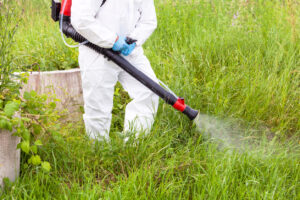Starting a Mosquito Control Business: How to Sell and Add Mosquito Control Services
You and your customers have worked hard to make their yard a comfortable oasis. Their lawn is lush, the landscaping is just right. The patio furniture is comfortable and arranged perfectly. The lighting creates an ideal ambiance. And spring is the right time to start enjoying all of that to the fullest. There’s just one problem. Or, really, thousands of them.
Mosquitoes.
They’re the buzzing pest that absolutely nobody wants around. They’re annoying, they’re everywhere and they’re a total buzzkill. They laugh in the face of citronella candles; they see over-the-counter bug spray as a challenge to overcome; they come in numbers too large for bug lights to have any effect. At worst, they spread disease; at best, they cause significant discomfort. They’re the reason that mosquito control programs are so important both to your customers and to your lawn care business.
More Than Just a Nuisance
Anyone who’s ever swatted a stinging mosquito from their arm knows what a nuisance these swarming insects can be. But mosquitoes can pose more than just a threat of itchy bites and ruined picnics: They can actually spread harmful diseases. Mosquitoes are happy to bite just about anyone, and there are no vaccines or specific medicines available for most of the diseases they spread. In the United States, mosquitoes are most likely to spread the West Nile virus or less common viruses including Eastern equine encephalitis and St. Louis encephalitis. Getting rid of mosquitoes is good for the health of the community, and it’s a service people want. This year is likely to provide yet another bumper crop of mosquitoes, with wetter, hotter weather than 2020, so getting out in front of the insect invasion is key…and your customers will be looking for mosquito control options.

Why Should I Add Mosquito Control Services to My Lawn Care Business?
Incorporating mosquito control services into your existing lawn care business can significantly enhance your service offerings and provide numerous benefits. Here are compelling reasons to consider adding these services:
1. Diversification of services:
Offering mosquito control services allows you to diversify your business, making it a one-stop solution for your clients’ outdoor needs. This diversification can help stabilize your revenue streams by adding a service that’s in demand from early spring through late fall.
2. Increased customer satisfaction:
Mosquitoes can detract from the enjoyment of the outdoor spaces that homeowners invest in maintaining. By providing mosquito control, you’re not only protecting your clients from the nuisance and health risks associated with mosquitoes but also enhancing their satisfaction and enjoyment of their lawns and gardens.
3. Competitive advantage:
Adding mosquito control services can give you a competitive edge in the market. It positions your business as a comprehensive care provider, setting you apart from competitors who offer traditional lawn care services only.
4. Higher profit margins:
Mosquito control services typically command higher profit margins than some traditional lawn care services. The initial investment in equipment and training can be offset relatively quickly by the added revenue stream, especially given the recurring nature of the service throughout the mosquito season.
5. Increased client retention:
Offering an additional valuable service like mosquito control can increase client retention rates. Satisfied customers are more likely to continue using your services year after year and less likely to switch to competitors, especially if they appreciate the convenience of dealing with a single provider for multiple services.
How to Start a Pest or Mosquito Control Business
 There’s no question: Offering mosquito control can be an excellent add-on service and source of additional revenue for your company. However, it’s important to know what the requirements are in your area before offering pest control services — rules and regulations will vary depending on your location. Once you’re ready to offer exterior mosquito control services, it’s essential to let your clients know how you can help them.
There’s no question: Offering mosquito control can be an excellent add-on service and source of additional revenue for your company. However, it’s important to know what the requirements are in your area before offering pest control services — rules and regulations will vary depending on your location. Once you’re ready to offer exterior mosquito control services, it’s essential to let your clients know how you can help them.
Understanding Your Local Pest Control Market
Before launching your mosquito or pest control business, a thorough understanding of the local market is essential. This initial step involves researching the types of pests prevalent in your area, the seasonal demand for pest control, and the competitive landscape.
Start by identifying the most common pest issues homeowners and businesses face in your region. Is it primarily mosquitoes, or are there other pests like termites, rodents, or cockroaches that also pose significant problems? Understanding the specific needs of your potential customers allows you to tailor your services accordingly. Next, assess the demand for pest control services throughout the year. Some pests are more active during certain seasons, affecting when your services will be most in demand. This knowledge will help you plan your marketing efforts and staffing needs.
Finally, analyze your competition. Look at the services they offer, their pricing structures, and their market positioning. Identify any gaps in their offerings or areas where your business can differentiate itself, such as eco-friendly pest control methods or specialized services for specific pests.
Gathering this information will provide you with a solid foundation to make informed decisions about your business strategy and service offerings, ensuring you meet the needs of your local market effectively.
Developing Your Business Plan
A well-crafted business plan is crucial for the success of your pest control business. It serves as a roadmap, outlining your business goals, strategies for achieving them, financial projections, and operational plans.
Start with an executive summary that provides a brief overview of your business, including your mission statement, the services you offer, and your target market. Then, detail your business structure, ownership details, and the experience and qualifications of your team.
Your business plan should also include a market analysis, summarizing your findings from researching your local pest control market. Based on this analysis, define your marketing and sales strategies. Explain how you plan to attract and retain customers, such as through digital marketing, partnerships with local businesses, or direct mail campaigns. Financial planning is another critical component. Include detailed projections for your startup costs, ongoing operational expenses, pricing strategy, and revenue forecasts. This section should also outline your funding requirements and sources, whether it’s through personal savings, loans, or investor funding.
Finally, describe your operational plan, including how you’ll deliver your services, the equipment and staff required, and your approach to customer service. This section should provide a clear picture of how your business will operate day-to-day.
A comprehensive business plan not only guides your strategic decisions but also is essential for securing financing and attracting investors.
Purchasing Mosquito Control Equipment and Supplies
Equipping your mosquito control business requires selecting specialized tools and supplies designed for the effective management and eradication of mosquitoes. Below is a list of essential equipment and supplies specifically tailored for mosquito control operations:
Mosquito Control Equipment:
- Backpack foggers: Portable fogging units for applying insecticides in areas with dense foliage and hard-to-reach spots.
- ULV (Ultra-Low Volume) Foggers: For dispersing fine droplets of insecticide over large areas, ideal for treating mosquitoes in open spaces.
- Larvicides applicators: Equipment for applying larvicides in water bodies to control mosquito larvae.
- Misting systems: Automated systems installed in residential or commercial properties for scheduled mosquito treatment.
- Mosquito traps: Devices that attract and capture mosquitoes for population monitoring and reduction.
- Personal protective equipment (PPE): Including respirators, gloves, protective eyewear, and clothing to protect technicians from chemical exposure and mosquito bites.
- Insect growth regulators (IGRs): Chemicals that inhibit the growth or reproduction of mosquitoes, used in conjunction with adulticides.
Supplies:
- Adulticides: Chemicals formulated to kill adult mosquitoes, selected based on effectiveness and environmental safety.
- Larvicides: Products designed to target mosquito larvae in water bodies before they can mature into adults.
- Natural and biological control agents: Such as BTI (Bacillus thuringiensis israelensis) dunks or granules, for environmentally friendly mosquito control.
- Surveillance tools: Equipment for monitoring mosquito populations, such as ovitraps and landing rate counts.
- Educational materials: To inform clients about preventive measures they can take to reduce mosquito breeding sites on their property.
When selecting equipment and supplies for mosquito control, consider the efficiency, coverage area, and safety of the products. It’s essential to choose EPA-approved insecticides that are effective against mosquitoes while minimizing impact on non-target species and the environment. By investing in the right equipment and supplies for mosquito control, you’ll be well-equipped to provide your clients with reliable and effective solutions to their mosquito problems, positioning your business as a leader in mosquito management.
Spread the Word of Your New Mosquito Control Services
 Start by letting everyone know that your company offers mosquito control programs. Make sure your website highlights your pest control services so that visitors can easily learn about what you can do for them and ask for a quote. It’s also important to make sure that your mosquito control services don’t look like an “extra” or an “afterthought” on your site; you want them to look like an important offering that your company takes seriously and is knowledgeable about, not an also-ran that you slapped on there just to make some extra bucks. Do you have a Customer Assistant Website? Promote “mosquito control” as an add-on that your customers will see when they log on to service their accounts. Next, add “pest control” to your list of service offerings in all of your online business listings (Google, Yelp, Nextdoor, etc.) so that potential customers searching for mosquito control help will have an easier time finding you, too. And be sure to add information about your mosquito services to any custom-printed invoices, statements and even prepay letters.
Start by letting everyone know that your company offers mosquito control programs. Make sure your website highlights your pest control services so that visitors can easily learn about what you can do for them and ask for a quote. It’s also important to make sure that your mosquito control services don’t look like an “extra” or an “afterthought” on your site; you want them to look like an important offering that your company takes seriously and is knowledgeable about, not an also-ran that you slapped on there just to make some extra bucks. Do you have a Customer Assistant Website? Promote “mosquito control” as an add-on that your customers will see when they log on to service their accounts. Next, add “pest control” to your list of service offerings in all of your online business listings (Google, Yelp, Nextdoor, etc.) so that potential customers searching for mosquito control help will have an easier time finding you, too. And be sure to add information about your mosquito services to any custom-printed invoices, statements and even prepay letters.
How to Market Your Mosquito Control Services
The obvious place to start marketing your mosquito management programs is with your current lawn care customers. They’re already happy, you already have a relationship with them and your techs are familiar with their properties. Many of them are likely to be excited that your trusted company is in the mosquito business and will be happy to add the service – once they know about it. Here are a few ways to market your mosquito control services:
- Email marketing: Send several messages to your existing list promoting your mosquito control offerings. An email marketing program might look something like this: Start with a formal announcement of your new mosquito services. Follow up with a short email introducing your new pest control tech, if you hired one. Next, an email offering exclusive “good customer” mosquito control program signup or pre-pay rates. Then, a message with pest control and mosquito avoidance tips. Get the idea? If your business management software offers solid automated marketing capabilities, setting up a program like this should be easy.
- Print marketing: It always helps to have some leave-behinds to reinforce your message. Door hangers and brochures will help keep your mosquito control services top-of-mind with your current customers and also will reach the ones who don’t open their email!
- Direct mail: This works for current and potential customers. Target entire neighborhoods in the areas you service or focus on new homeowners, those with yards of a certain size, specific demographics (like families with pets or kids), etc. A well-targeted direct mail campaign advertising your mosquito management services will reach the specific customers you need to reach and help reinforce your company brand when those people start looking for a mosquito control company.
- Tell your techs to spread the word! Make sure your in-field technicians note if they see signs of mosquito issues or infestations as they are performing services. Not only can they let customers know in their service notes, but you can then specifically target those customers with personalized mosquito control offers.
- Post on your social channels: Start posting about your mosquito control services on all of your social channels. Let customers know what you can do for them, how you can help, and how they can find out more.
Looking to Add Pest Control Services to Your Business? Let RealGreen do all of the Heavy Lifting
When you partner with RealGreen, you can easily add mosquito control to your existing service offerings. Sign up for a free demo today to find out more about how we can help you grow your business with our effective software and marketing solutions.
FAQs
Why should I consider adding mosquito control services to my lawn care business?
Adding mosquito control services diversifies your offerings, enhances customer satisfaction by providing a more comfortable outdoor environment, and can significantly increase your revenue through high-margin services. It sets your business apart from competitors and meets the growing demand for comprehensive outdoor living solutions.
What initial steps are required to add mosquito control services?
Begin with market research to understand local demand, followed by obtaining the necessary certifications and licenses specific to pest control in your area. Next, invest in the right equipment and supplies, and ensure you and your staff receive appropriate training in mosquito control techniques and safety procedures.
How can I market my new mosquito control services?
Update your website and online listings to include mosquito control services, engage in targeted email marketing campaigns to your existing customers, utilize social media platforms to raise awareness, and consider direct mail campaigns in your local area. Highlighting the benefits of mosquito control in all communications can help attract interest.
Can mosquito control services be profitable?
Yes, mosquito control services often have higher profit margins than standard lawn care services due to the specialized nature of the work and the high demand during mosquito season. By offering package deals or seasonal promotions, you can further maximize profitability.
What kind of training do my employees and I need for mosquito control?
Training typically covers safe pesticide application methods, understanding mosquito biology and behavior, equipment operation, and compliance with local regulations. Many states require specific certifications for individuals applying pesticides, so it’s important to check with your local regulatory agencies.
How do I price my mosquito control services?
Pricing should take into account the cost of chemicals and equipment, labor, the size of the area being treated, and your desired profit margin. Research local competitors’ pricing to ensure your services are competitively priced yet still profitable.
What are the key challenges in providing mosquito control services?
Challenges include staying updated with local regulations and safety standards, managing seasonal demand fluctuations, and ensuring the effectiveness of treatment in diverse outdoor environments. Educating customers about the importance of ongoing treatment for effective mosquito control can also be a challenge.



